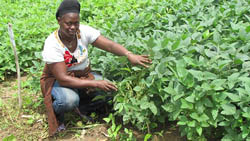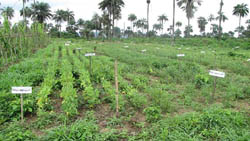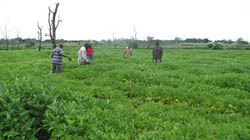Something beyond the traditional farming experience in Sierra Leone is being introduced to let farmers benefit from grain legume crops. The common practice upon which the farming of these crops had been centred lacked maximum productivity and did not focus on nutritional and economic values. With the introduction of the N2Africa Project, however, those setbacks and disadvantages will soon become an experience of the past.
N2Africa is a multi-country project funded by The Howard G. Buffett Foundation and the Bill and Melinda Gates Foundation to provide smallholder farmers in Africa with opportunities to produce, utilize, and market protein-rich varieties of soybean, cowpea, common beans and groundnut. These varieties are reported to be very suitable for improved nutrition of families, wealth creation (e.g., through market linkages with food/baby foods and livestock/poultry industries) and can be part of biological methods to improve soil fertility. In Sierra Leone the project is implemented by the International Institute of Tropical Agriculture (IITA), in close partnership with Wageningen University (WU) in the Netherlands and the Sierra Leone Agricultural Research Institute (SLARI).
 |
 |
EXPECTED BENEFITS
Under N2Africa Project soil infertility can be halted and reversed with the use of specific varieties of grain legume crops. In a novel research approach, the legume seeds are treated wiith biological inoculants before planting to increase their inherent ability to trap nitrogen gas from the air and make that gas available to crops in the a form that they can take up . When the nitrogen rich residues of the crop are returned to the field, it helps to improve soil fertility, thereby reducing huge yield losses caused by deteriorating soils.
Moreover, the legume provides additional nutritional and economic benefits. Soybean, for example, can be processed into soy-milk, soy-cheese, and infant weaning foods (e.g. Bennimix); the crop is an excellent source of vegetable oil; soybean cake is an excellent livestock feed especially in the poultry industry; soybean is also used to nutritionally fortify gari and other cassava products.
The N2Africa Project will partner with the Ministry of Agriculture Forestry and Food Security (MAFFS), NGOs and the private sector (e.g. Sierra Akker, Bennimix) to provide increased opportunities for food security and income generation to smallholders in line with both public and private sector needs.
TRIALS
N2Africa field trial programs have been established for soybean, cowpea and groundnut at various sites in the country.
One of the site locations is at Sumbuya, 6 miles from Bo, southern province. According to the site’s SLARI Field Supervisor Mohamed Nyoniyo, planting of 4 soybean varieties is under way to enable scientists to determine appropriate planting dates for best yields. The relevant information will be passed on to potential farmers.
Another trial planted at the site features cowpea variety testing and pest control. The site’s SLARI entomologist Mr. Augustine Mansaray explained that 6 varieties are on trial to determine which of the varieties performs well. "We want to see which varieties perform well under spraying and non-spraying regimes," he said. The trials will also enable SLARI researchers to know and later recommend appropriate time to plant the new varieties introduced by IITA from Nigeria. The early planting cowpea trials were being harvested at the time of the site visits.
There is a soybean trial at Serabu on the Bo-Kenema highway in the Kenema district, Eastern Province. The trial exercise here involves the application of a biological inoculum together with fertilizer on one plot of soybean, and another plot without inoculum but with fertilizer. Soybean plants in plots with inoculum looked greener, thereby indicating better nurture and inevitably a prospect for high yield in the future; Soybean plants in plots without inoculum looked pale indicating under-nourishment and probably a poor future yield.
The Sumbuya site also has a groundnut trial with new varieties introduced by IITA, planted at four different locations, with and without fertilizer. Another trial plot with groundnut variety Samnut 23, 22 and JL24 24 was observed at Old Mosongo near Njala. Because of rodent infestation and heavy downpour of rain, the plants were not doing very well. The Samnut 23 and 22 are expected to be harvested between 110 and 120 days; whilst JL24 will be harvested between 91 and 110 days.
 |
 |
IMPRESSIONS
Sierra Leoneans are very familiar with the cultivation of cowpea and groundnut, but soybean cultivation is a new experience. Soybean production will therefore require closer scientific guidance in order for the country to realize the expected benefits from the crop. This is assured by IITA, SLARI and WU scientists.
A large swap of land at the Njala University at Makonde (Moyamba district, Southern Province) is cropped by SLARI as a seed multiplication site to produce quality seeds of soybean, cowpea and groundnut in quantities needed for future distribution to farmers associated with partner MAFFS, NGOs and the private sector. Another soybean and groundnut multiplication site is established at Mange (Port Loko district, Northern Province) by the private sector partner Sierra Leone Agriculture.
During field visits Dr. Braima James (IITA Country Representative in Sierra Leone), was visibly impressed with the performance of the seed multiplication plots and field trials. "N2Africa project is clearly responding to needs IITA partners have expressed over the years, especially in national efforts to increase wealth creating opportunities for farmers"
Dr. Michael Johnny (Farm Liaison Officer, N2Africa Project) and Ms Edna Bangali (Research Technician of the project) joyfully expressed their appreciation of their collaboration with SLARI scientists on the project. In the words of Dr. Johnny "We are very satisfied with the progress so far. We are expecting that subsequent collaboration with Government, NGO and private sector partners will help beneficiary farmers to fully take up cultivation of soybean and the other grain legume crops as a business."
With N2Africa Project, smallholder farming of food grain legumes is now poised for a revolution leading to greater productivity and economic gains.
By George S. Khoryama (freelance journalist in Sierra Leone. He accompanied IITA and SLARI staff in N2Africa field activity monitoring visits 17 to 20 August. His observations form the basis of this report)
